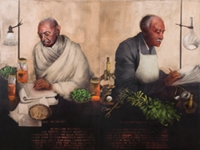Search
By Amb. Kenneth M. Quinn
Published in The Des Moines Register
May 9, 2014

This is an excerpt from the commencement speech given at Simpson College on May 3 by Kenneth M. Quinn, president of the World Food Prize Foundation in Des Moines and a U.S. Foreign Service diplomat for 32 years.
I spoke at the three-day Milken Institute Global Conference in Los Angeles that attracted some big-name participants. While I was leading a panel on global food security issues, down the hall Sean Penn was giving a talk, Charlize Theron would make a presentation and Matt Damon sat in on a panel about global water shortages.
But the biggest story of the week was about the comments made by the owner of the Los Angeles Clippers basketball team, Donald Sterling, who was recorded telling his girlfriend how much he objected to seeing pictures of her walking in public with black men, like Magic Johnson, the NBA legend and one of the most successful businessmen in Los Angeles. Magic Johnson was at that same conference that I was and so I saw firsthand the devastating impact of such a blatant racist statement.
As I thought about this terrible incident, two things struck me: First, that the statement had been made, not in a special setting or public remarks or press interview, but rather when it was a totally unexpected moment for Mr. Sterling; and, second, that his response and statements clearly reflected traits that were implanted in him long ago and that were an integral part of him. Suddenly, in that unexpected moment, those traits came to the fore, and they represented his true character and will be forever the way his life is defined — as a racist.
That event reminded me of another black man who was also told that he was not to be seen associating with white people. That man had been turned away by colleges in several nearby states just because of the color of his skin. Somehow, he ended up in Iowa in Winterset, near the bridges of Madison County, doing laundry. Until one day, in the 1880s, when a college stepped forward to admit him and to turn him into an acclaimed artist whose works would be displayed at the Columbian Exposition in Chicago.
And then, a faculty member at that college, a woman named Etta Bud, saw in him great scientific potential, and she urged him to leave that school and pursue a degree in science at a university with an agricultural science program. That black man went there and obtained his bachelor’s and master’s degrees and went on to become one of America’s most distinguished agricultural scientists of the first half of the 20th century.
That man was George Washington Carver, and that school that first admitted him was Simpson College.
Just as the NBA commissioner struck a strong blow against racism by banning Donald Sterling for life, so too did Simpson College in admitting Carver. Simpson’s actions not only had an impact on American science, but they resonated around the world.
In the World Food Prize Hall of Laureates in Des Moines, there hangs a painting showing Professor Carver and Mahatma Ghandi writing to each other. This painting reflects the story that in 1929, as he was beginning the struggle for India’s independence from British colonial rule, Ghandi, who was a vegetarian, sought advice from a scientist in America. That scientist was George Washington Carver, and though they would never meet, they exchanged letters for at least six years, with Carver providing his “beloved friend Mr. Ghandi” with guidance on how he could remain strong during the long hard slog ahead.
In Washington, D.C., just across from the White House, sits Lafayette Park in which we honor those foreigners who helped us obtain our independence. You should be so proud that you are graduating from a college that made it possible for George Washington Carver to play a small but not insignificant role in over one billion citizens of India living today in freedom.
I believe that your studying here at this great institution has implanted in you those same traits that guided this school to admit Carver and then to send him on his remarkable journey to Iowa State University and eventually to the Tuskegee Institute in Alabama.
In my own life, I unexpectedly confronted a situation in Vietnam during the war, when late one night the mother of a wounded Vietcong insurgent — our enemy — was pleading for someone to take her badly wounded son to medical treatment. It required driving down a dark and dangerous road late at night, and everyone who was there turned away.
I started to walk away, too. But then, something implanted in me at Loras College caused me to turn back and say, “I’ll drive him to the hospital.”
I wish the story had a happier ending. The young man died, but the lesson was clear.
Sometime in each of our lives, we may suddenly have a matter thrust upon us which requires a decision. It may be about your business, your education or your family, and it may be a decision of great moral consequence. I hope that when that unexpected moment comes, that you will be guided by the great traditions of this college and by the traits that your Simpson education has implanted in you.
ABOUT THE AUTHOR:
KENNETH M. QUINN, president of the World Food Prize Foundation in Des Moines, was a U.S. Foreign Service diplomat for 32 years. Contact: kquinn@worldfoodprize.org.


